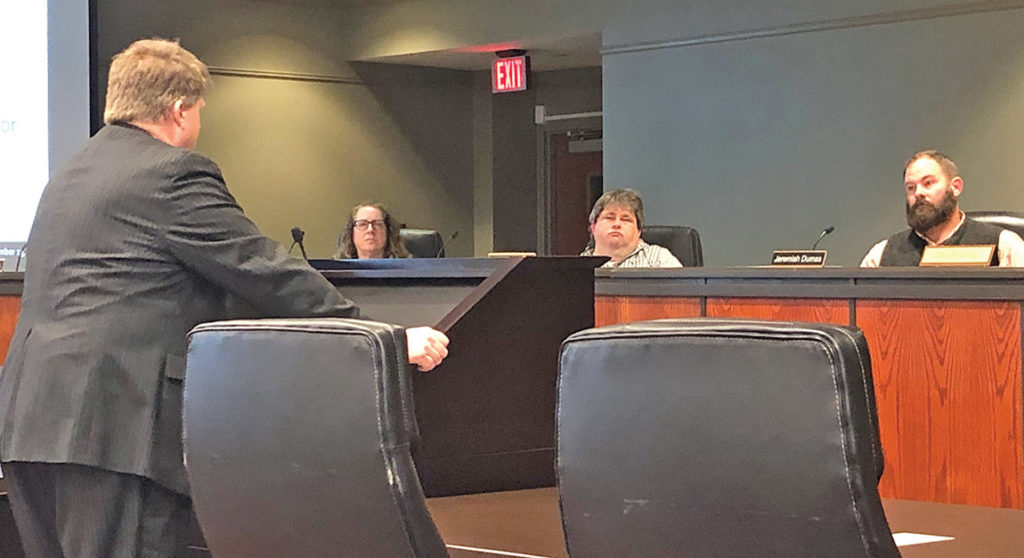STARKVILLE — The city Planning and Zoning Commission denied a local couple’s appeal Tuesday for a home occupancy permit at 400 Greensboro St.
Will and Stephanie Arnett bought the home in August with the intention of using it for a second home and office space.
While initially granted a home occupancy permit, City Planner Daniel Havelin revoked it because the Arnetts were not using it as a primary residence.
Following a roughly 30-minute executive session, as well as public presentations, on Tuesday, the Planning and Zoning Commission unanimously upheld Havelin’s decision citing the “detrimental effect” approving the appeal could have on residential neighborhoods. This forces the issue before the board of aldermen.
“It’s a tough decision any time you have individuals that own a home and want to do the things they want to do,” said commission chairman Jeremiah Dumas. “Unfortunately, this became a little more aggravated than it should be, but I think the commission just took the items that were before them, and I believe their vote was on that.”
The house was the residence of Betsy Stark, who lived there her entire life. Stark died in 2019 at the age of 103. The Starks were one of Mississippi’s earliest pioneer families and the city of Starkville’s namesake.
The city’s unified development code allows homeowners to operate businesses out of homes where they reside. However, operating businesses in residential areas when the homeowner does not reside in the home requires a special exception.
Stephanie Arnett applied for a home occupation permit earlier this year to operate a real estate business out of a part of the house.
After initial approval, Havelin said information indicating she was only operating the business and not living there, came to his attention.

“Once I became aware through a phone call and in-person conversations, that the only use on the property was a real estate office, I emailed her,” Havelin told commissioners. “In that email, I cited the definition of a home occupation and informed her she would need to apply for a use exception to operate at that location.”
She then applied for the special exception, but she withdrew the request before it could go before the board of aldermen, opting instead to appeal Havelin’s decision to revoke the home occupation permit.
The appeal focused on the term “resident” as used in section 13.5.9 of the Unified Development Code — specifically, what defines a resident in terms of the home occupation permit. The code does not make a distinction, for example, between a primary and a part-time resident.
“You can have multiple residences simultaneously,” said William Starks, the Arnetts’ attorney. “You should be allowed to have a home occupation permit, even if it’s your second home. But even if you don’t agree with that, we ask that you find the application of it was incorrect because (Stephanie) does live there. She’s registered to vote there. She’s got her car tag registered there. She spends most of her time there.”
The Dispatch confirmed with the Oktibbeha County Circuit Clerk’s office that Stephanie is registered to vote at the Greensboro address. Her husband is registered at a different address.
Havelin, who noted he helped author the code, said the term “resident” implicitly meant the home was that person’s primary residence.
“The unified development code, printed out, is over 400 pages long,” Havelin said. “It would be impractical then to include every term used in the UDC in the definition section. A lot of terms are plain-meaning or just common knowledge. Therefore when I wrote the code, a provision was included for the interpretation of words. In that provision it lists several resources that may be used to define a word. The key word is ‘may.’ Ultimately, I have the authority, as city planner, to define the word in the context of it being used. In this context, it is being used to discuss a home office in a residential structure in a residential zoning district.”
The Arnetts’ efforts at the house met fierce resistance from other Greensboro Street neighbors, many of whom signed a petition to keep the real estate business off their street.
Recently, city code enforcement officers were called to the home several times. After the Arnetts asked them not to come back without a warrant, officers returned with one.
During public comments at Tuesday’s meeting, Jeremy Murdock, a spokesman for the dissenting Greensboro Street residents, reaffirmed their position.
“Our stance on the issue has not changed,” Murdock said. “We feel that the intent of the code is very clear and we support the city’s definition of home occupation. We ask that you uphold Mr. Havelin’s decision.”
After the meeting, Starks said he and his clients were disappointed in the commission’s decision, noting he didn’t feel commissioners accurately addressed all of the concerns.
“We were optimistic that they would provide some relief here and provide some definition of what residing is because, how many nights does somebody have to stay there to qualify as residing?” Starks said. “The other part of it is (Havelin’s) application of it. I don’t think the Planning and Zoning commission addressed both issues. One was the interpretation, the second was whether or not she resided there. I think they failed to consider that issue and whether he made a correct decision about that.”
You can help your community
Quality, in-depth journalism is essential to a healthy community. The Dispatch brings you the most complete reporting and insightful commentary in the Golden Triangle, but we need your help to continue our efforts. In the past week, our reporters have posted 44 articles to cdispatch.com. Please consider subscribing to our website for only $2.30 per week to help support local journalism and our community.







